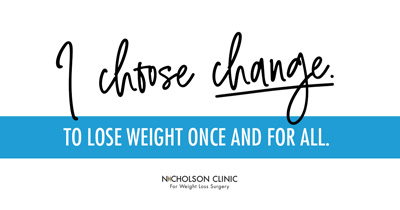
If you want to lose weight, there are countless diet plans, exercise programs and medications you can try — all with the promise of helping you lose weight and keep it off. While you may find success with many of these options in the short term, weight loss surgery is still the most effective approach for significant and lasting weight loss.
Perhaps the greatest benefit of weight loss surgery is that it treats more than obesity itself. According to the American Society for Metabolic and Bariatric Surgery (ASMBS), weight loss surgery also “treats other conditions like diabetes, heart disease, high blood pressure, arthritis and acid reflux. In addition, surgery greatly reduces the risk of death from cancer, diabetes, heart disease and other diseases.”
Here are some of the key reasons weight loss surgery is more effective than diet, exercise and medications for weight loss.
Weight loss surgery provides the best chance for long-term weight loss.
According to the Cleveland Clinic, as many as 80 to 95 percent of dieters will gain back the weight they’ve worked hard to lose through other weight loss programs. No matter how hard you work to lose weight, eventually your body will start working against you, fighting to maintain the weight it was prior to dieting. It’s a phenomenon known as “weight set point.”
Set point is a combination of genetics, hormones, behavior and environment. Think of it as the weight your body is programmed to be—even if that weight is heavier than what is healthy.
Learn more about set point here.
Bariatric surgery can change the way your body responds to the environment. Instead of fighting the set point like a diet does, surgery may recalibrate it by altering the hormones that stimulate weight gain. After surgery a body regulates itself to a new set point, allowing the patient to lose weight and keep it off.
Weight loss surgery is effective at treating diabetes, among other health conditions.
Diabetes affects nearly 30 million Americans and is the seventh leading cause of death in the U.S. Type 2 diabetes is a weight-related disease that develops when the body becomes insulin resistant due to excess body weight. The vast majority (90 percent) of people living with Type 2 diabetes are overweight or obese.
Diabetes should not be taken lightly. It can lead to a number of dangerous health complications and conditions including:
- High blood pressure
- Stroke
- Cardiovascular disease
- Skin disorders
- Nerve damage (neuropathy)
- Amputations
- Glaucoma
- Cataracts
- Diabetic retinopathy
Diabetes can be controlled with diet and weight management, but new research has found that weight loss surgery may help diabetics achieve complete or partial remission of diabetes symptoms over time. In some cases, diabetic patients who undergo weight loss surgery are able to reduce or eliminate their dependence on diabetes medications to control blood sugar after surgery.
- 80 percent of gastric sleeve patients have been cured of Type 2 diabetes.
- 95 percent of gastric bypass patients have been cured of Type 2 diabetes.
Learn more about weight loss surgery and diabetes here.
Weight loss surgery helps patients lose more weight than weight loss medications.
While there is a place for weight loss medications as they can be effective for some people, studies show that most weight loss medications can only help a patient lose about three to seven percent of their excess body weight.
Comparatively, patients who choose to undergo weight loss surgery can expect to lose between 50 and 70 percent (or more!) of their excess body weight. The increase with weight loss with surgery is due to the mechanics of surgery. Bariatric procedures like gastric sleeve and gastric bypass limit how much the patient can eat through restriction of the stomach.
Some weight loss medications should only be taken short-term before the effects wear off. In other cases, some people experience side effects from weight loss drugs that require them to stop taking the medication altogether. For these reasons, weight loss medications are typically seen as a short-term solution to weight loss, compared to weight loss surgery.
While there is no question that diet, exercise and even weight loss medications can be useful (and even necessary for health), most people who have a significant amount of weight to lose will find the greatest, lasting success with weight loss surgery.
To learn more about the various weight loss surgery options available, or to schedule an appointment for a consultation, give us a call at 972-494-3100.












